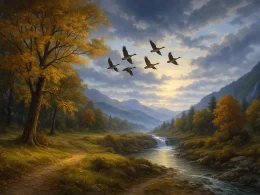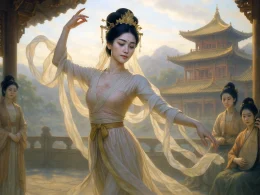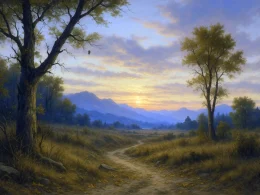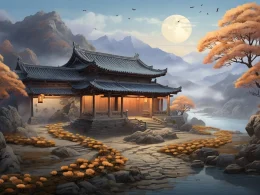The dawn horn blows through the empty town,
Its wail drifting down willow-lined lanes.
On horseback, in thin robes—the chill gnaws deep.
I’ve seen all these golds and tender greens before—
Every hue an old acquaintance from Jiangnan.
In this stillness,
Tomorrow comes the Cold Food Festival again.
I force myself to bring wine
To her house by the little bridge,
Dreading the day pear blossoms all fall,
Turning spring to autumn.
Swallows dart past,
Asking where spring has gone.
Only the pond answers—
With its indifferent jade.
Original Poem
「淡黄柳 · 空城晓角」
空城晓角,吹入垂杨陌。
马上单衣寒恻恻。
看尽鹅黄嫩绿,都是江南旧相识。正岑寂,明朝又寒食。
姜夔
强携酒、小桥宅。
怕梨花落尽成秋色。
燕燕飞来,问春何在?唯有池塘自碧。
Interpretation
Composed in 1187 during Emperor Xiaozong's reign, this ci poem was written when Jiang Kui resided in Hefei as a long-term sojourner. Witnessing the city's desolation juxtaposed with spring scenery, he poured his complex emotions into this work, using motifs like "dawn horns," "weeping willows," and "pear blossoms" to express his rootless existence and emotional solitude. The poem is marked by its profound yet understated sentiment, ethereal beauty, and distinctive style.
First Stanza: "空城晓角,吹入垂杨陌。马上单衣寒恻恻。看尽鹅黄嫩绿,都是江南旧相识。"
Kōng chéng xiǎo jiǎo, chuī rù chuí yáng mò. Mǎ shàng dān yī hán cè cè. Kàn jìn é huáng nèn lǜ, dōu shì jiāng nán jiù xiāng shí.
Dawn horns echo through the empty town,
Down willow-shaded lanes their mournful sound.
On horseback, thin-robed, chilled to the bone—
These gold-tinged greens I've wholly known,
All old friends from Jiangnan's springtime ground.
The stanza opens with acoustic desolation—"dawn horns" (晓角) piercing the "empty town" (空城), their echoes trailing along "willow-shaded lanes" (垂杨陌). The poet's "thin-robed chill" (单衣寒) merges physical and emotional coldness, while "gold-tinged greens" (鹅黄嫩绿) of willows become nostalgic triggers for memories of Jiangnan's lost springs.
Second Stanza: "正岑寂,明朝又寒食。强携酒、小桥宅。怕梨花落尽成秋色。燕燕飞来,问春何在?唯有池塘自碧。"
Zhèng cén jì, míng zhāo yòu hán shí. Qiǎng xié jiǔ, xiǎo qiáo zhái. Pà lí huā luò jìn chéng qiū sè. Yàn yàn fēi lái, wèn chūn hé zài? Wéi yǒu chí táng zì bì.
In this deep hush, Cold Food Day nears.
I bring wine to the bridge-house, half-hearted,
Dreading how pear blossoms' fall might turn
Spring's hues to autumn's hues, departed.
Swallows dart, asking where spring's gone—
Only the pond stays blindly, coldly jade.
Here, seasonal transition amplifies solitude. The approaching Cold Food Festival (寒食节), traditionally a time for grave visits, underscores absence. The poet's reluctant wine-bearing ("强携酒") reveals perfunctory ritual observance, while "dreading pear blossoms' fall" (怕梨花落尽) captures his acute sense of time's erosion—spring's fragility mirroring human transience. The swallows' unanswered question and the pond's "blind jade" (自碧) reflect nature's indifference to mortal sorrow, leaving the poet's longing suspended in crystalline stillness.
Holistic Appreciation
The lyric opens with "morning horns over an empty city," establishing an ethereal yet desolate atmosphere that sweeps away worldly clamor. The first stanza depicts a solitary traveler entering the city in the lingering chill of spring, steeped in quiet melancholy. The "tender yellows and soft greens" evoke memories of past wanderings in Jiangnan, infusing the scenery with emotion and hues with nostalgia. The second stanza shifts to the approach of the Cold Food Festival and the desire to visit a beloved—though the landscape remains familiar, the sentiment has changed. With pear blossoms about to fall and spring's beauty fleeting, the closing line, "only the pond stays emerald on its own," reveals profound sorrow beneath its serene beauty, highlighting the poet's grief over spring's indifference and the absence of a cherished figure.
Though never explicitly stating "the beloved is gone" or "this foreign land is lonely," every line whispers "spring departs with nowhere to be found" and "the past is empty without that person," embodying the pinnacle of subtle restraint. The character "自" (on its own) in the final line is a masterstroke—hinting at absence and unrequited longing while conjuring a wistful beauty in nature's indifference.
Artistic Features
This lyric epitomizes three hallmarks of Jiang Kui’s style: crystalline clarity, profound emotion couched in restraint, and exquisite musicality.
- Scenery as Emotional Allegory, Understated Yet Resonant: The spring scenes avoid gaudy embellishment. Instead, "tender yellows and soft greens," "pear blossoms about to fall," and "the pond stays emerald" create an atmosphere where grief lingers like hidden threads beneath fresh, delicate hues.
- Allusions as Light as Breeze, Lingering Like Echoes: The "small bridge" may symbolize a lover, subtly woven into the landscape. Images like "morning horns" and "swallows" convey emotion obliquely, deepening the lyric's affective power.
- Melodic Precision, Rhythm Like a Sigh: The tune Pale Yellow Willow, composed by Jiang Kui himself, flows with plaintive grace. Dominated by oblique tones, its cadence mirrors the lyric's quiet sorrow, letting emotion unfold naturally through its rises and falls.
Insights
With unparalleled delicacy, this lyric captures the solitude and loss felt amid spring’s vibrancy. It reveals not only the poet’s loneliness in a foreign land, where longing finds no anchor, but also the human yearning for irretrievable beauty and the lament over life’s transience. In today’s restless world, the poem reminds us: true emotion lies not in loud proclamations but in silent attention to a single blossom or willow twig. To preserve, amid life’s chill, the clarity of "a pond staying emerald on its own" is itself an act of profound devotion—a testament to steadfastness and grace.
About the poet
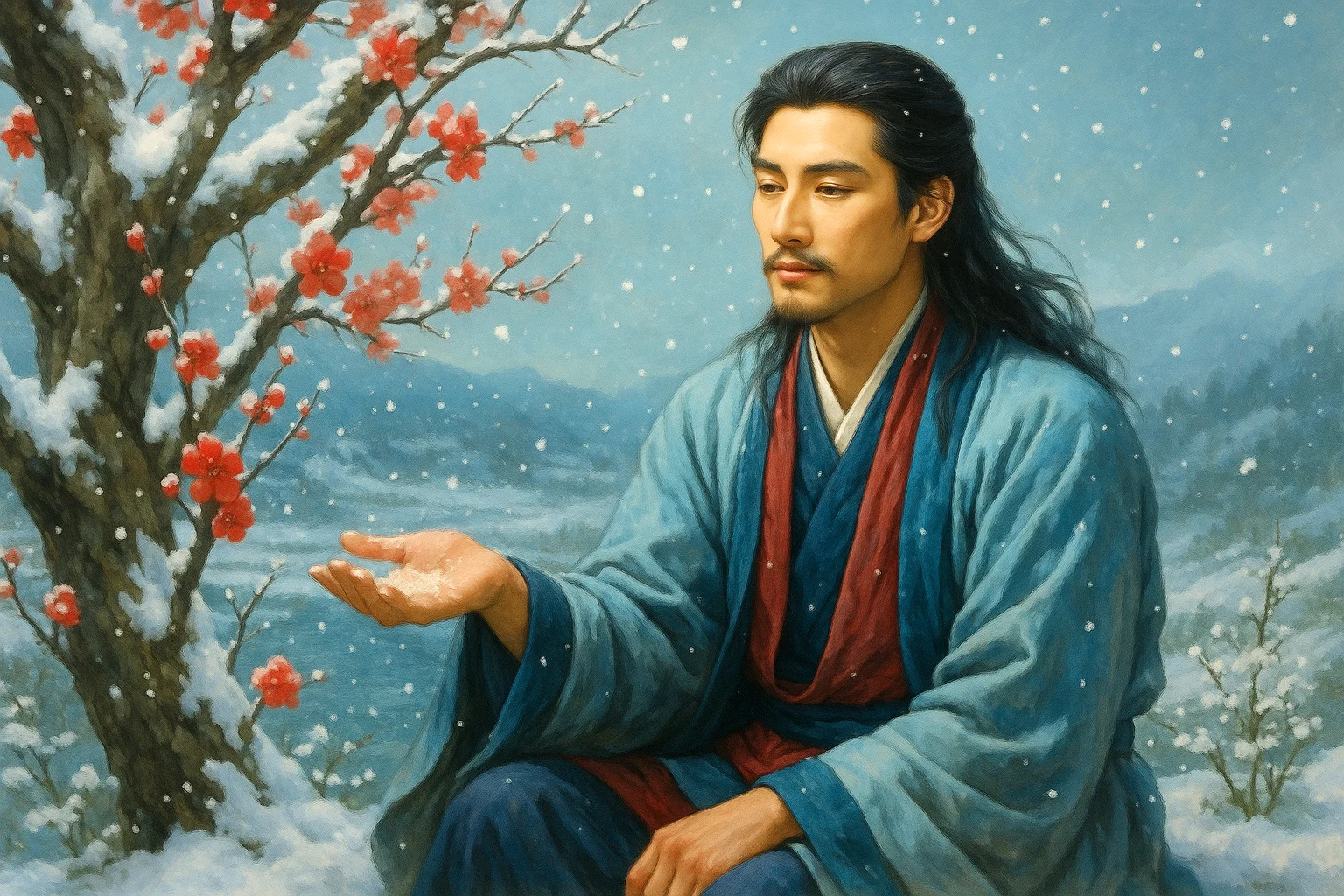
Jiang Kui (姜夔, c. 1155 - 1221), a native of Poyang, Jiangxi, was a Southern Song Dynasty lyric poet and musician. He remained a commoner throughout his life. His lyrics are known for their ethereal and austere style, and his poetry is also highly regarded. Along with Fan Chengda and Yang Wanli, he is celebrated as one of the "Four Great Masters of the Restoration."









